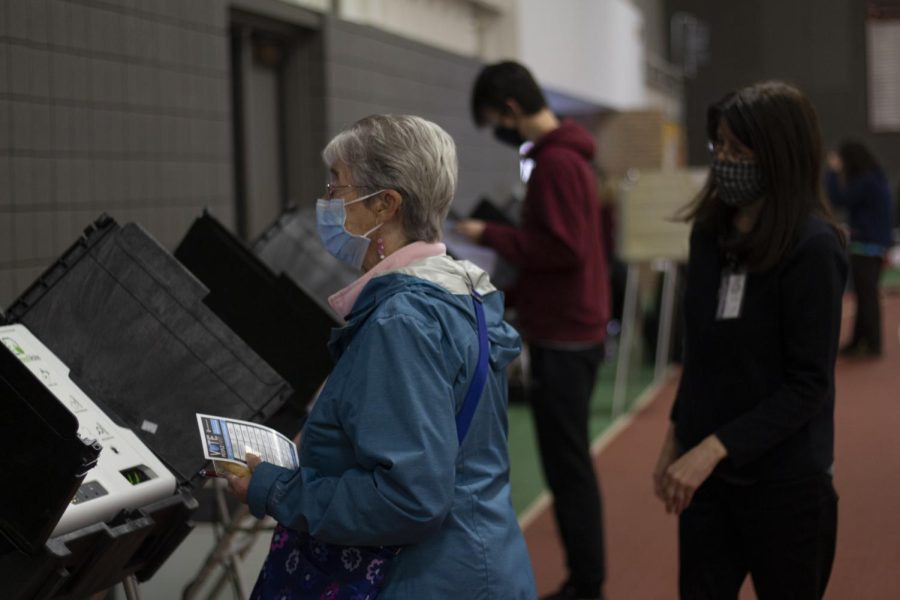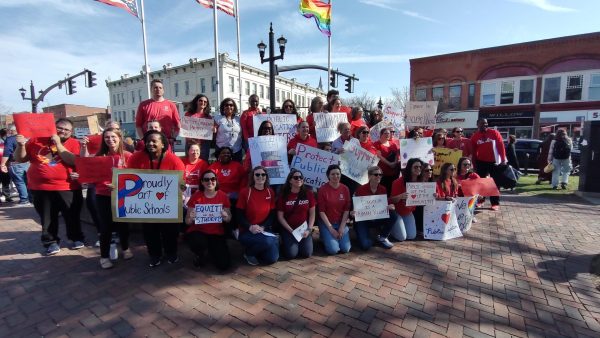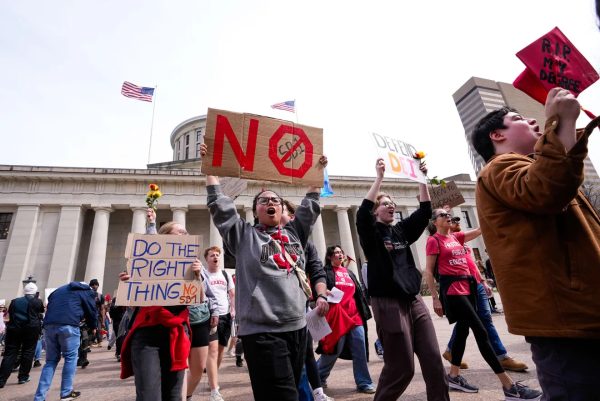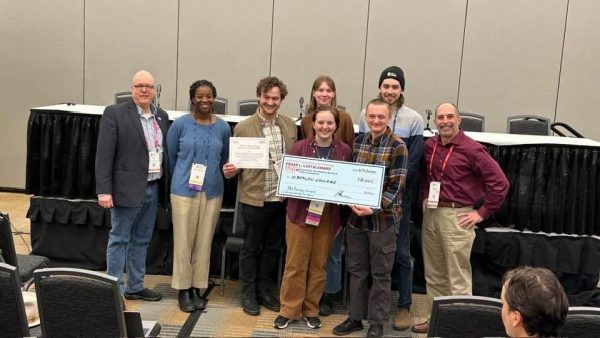Tax Bills, Amendments to State Constitution on Midterm Ballot
Voters can cast ballots on Election Day, Nov. 8, or during early voting beginning Oct. 12.
The annual Oberlin Community Candidates Night took place on Tuesday, Sept. 20. Candidates presented their platforms and answered questions from College students and community members, providing insight into the November midterm election. The ballot will also feature two proposed amendments to the Ohio State Constitution, four tax levy renewals, and two Oberlin income tax renewals.
The Community Candidates Night kicked off with District 56 Ohio State House Representative Democrat Joe Miller sharing the stage with the candidate running as his functional replacement, President of Oberlin City Council Bryan Burgess. Miller currently represents Oberlin, but as a result of this year’s redistricting process, District 56 no longer encompasses the City, and Miller will instead be running for reelection to represent District 53. Burgess, on the other hand, is running for election to represent State House District 54, which does include Oberlin.
Following Miller and Burgess, candidates running for State Board of Education, Congressional Representatives, State Senator, and Treasurer of State fielded audience questions. Despite his candidacy for State Senate District 13, Lorain Democrat Anthony Eliopolous gave voice to frustration felt by municipal governments after years of state budget cuts.
“When it comes to the fundamental needs of a community, that should not be determined by state senators,” Eliopolous said. “That sort of stuff should just be giving the resources to the local communities. A lot of the talk today is about returning that local funding to local governments, and to me, that’s just the way it ought to be. Because we’ve had conversations: Does Oberlin deserve a park? Does Amherst deserve a park? Does Lorain? I mean, shoot — they all deserve a park.”
Candidates for County Auditor and County Commissioner presented their platforms, and six judges running for Lorain County Court of Common Pleas or District Court of Appeals closed out the night.
Magistrate Amber Crowe, a Democratic candidate for Judge of the Ninth District Court of Appeals, spoke passionately about demystifying the workings of the court, echoing other candidates’ enthusiasm to return power to localities and individuals.
“I think we could engage and take opportunities to have people come to the court for us to go and do speaking engagements, and explain what the court actually does,” Crowe said. “But I think one of the best ideas I’ve seen, and what I would really like to implement more, is engaging high school students — having mock trials, allowing them to come in and see and observe oral arguments, and things like that.”
Crowe emphasized the importance of justices holding themselves accountable to their community, especially considering the context of recent landmark decisions made by the U.S. Supreme Court.
“I think at this point in time, we have seen the impact that courts have on our daily life — how we are in our daily lives is going to be how we serve on the bench. So, I respect the single mom that comes before me [who] maybe can’t use her last bit of vacation time, and I change my pre-trial dates,” Crowe said. “It’s really all about what we can do.”
Magistrate Erica Voorhees, a Democratic candidate for Judge of the Ninth District Court of Appeals, expressed a similar sense of renewed urgency and explained what motivates her civil service.
“My kids are watching, and I’m not going to sit around and do nothing when it feels like I’m able to help my community in some way,” Voorhees said.
In previous years, the event was supplemented by an issues night, dedicated to unpacking issues, referendums, and other non-candidate items on the ballot.
This coming election features two proposed income tax renewals which represent 0.2 percent and 0.6 percent of Oberlin residents’ incomes. If renewed, these taxes would generate $647,000 and $1.9 million respectively on an annual basis. Those tax dollars would go to the City’s general fund, which supports City operations including police and fire departments, parks and recreation, and maintenance of Westwood Cemetery.
“Neither one is intended to increase taxes,” Oberlin City Finance Director Sal Talarico said. “These are continuations of existing taxes.”
The income tax renewals would go into effect in 2025. Oberlin City Council voted to seek early renewal for the two taxes so as not to compete with other funding renewals on the ballot in 2024, including those for Oberlin City Schools and the Oberlin Public Library. Burgess places the Council’s request for renewed funding in the context of state cuts to the local government fund started during former Ohio governor John Kasich’s administration. The local government fund distributes money to localities for the purpose of maintaining infrastructure and providing public services.
“Between cuts to the local government fund and the estate tax, Oberlin took a hit of somewhere just north of a million dollars,” Burgess said. “Cities, including Oberlin, had to find some way to fill that funding gap, and we had no choice but to ask the voters locally.”
Burgess argues that the cuts forced an undue burden onto localities, resulting in increased municipal taxation across Ohio.
“If someone is traveling in through Oberlin on the state route and they get into a car accident, they’re not an Oberlin resident — they live somewhere else,” Burgess said. “But caring for that person falls on Oberlin taxpayers. Now, it’s the right human thing to do, but because it’s the right human thing to do, that’s why the state should be funding it.”
The levy renewals include taxes to fund Lorain County 911 services, the Lorain County Drug Task Force, the Lorain County Community College’s University Partnership Program, and the Lorain County Board of Mental Health, Addiction, and Recovery Services.
If all four levies are renewed, though they have different expiration dates, they will tax Lorain County residents a total of approximately 33 cents per every $100 of valuation. Collection will start in 2024 for all four levies except the one funding the LCCC University Partnership, which will commence in 2023.
The LCCC’s University Partnership offers 3+1 education programs with other Ohio universities, including The Ohio State University and Kent State University, that give LCCC students the opportunity to earn certain degrees at partner schools while paying only the price of community college tuition for their first three years of university. As determined by the U.S. Department of Education, LCCC’s net price comes out to $2,952.
The tax levy to benefit the Mental Health, Addiction and Recovery Services Board of Lorain County would go towards “providing essential mental health and recovery services and facilities” for Lorain residents. According to a statement released by the MHARS Board, the renewal would “ensure that families have mental health crisis options in emergencies, treatment and prevention programs for children and adults, and addiction recovery services.”
Funds from the renewal would also go toward construction of a crisis receiving center for residents struggling with mental health and addiction in Lorain, where no such facility currently exists.
Oberlin College, as a tax-exempt nonprofit, will not be financially affected by the potential renewal of the tax levies. Likewise, the majority of College students, who do not pay property taxes on off-campus housing and whose incomes don’t meet the $10,000 threshold for state taxation, will not feel the impact of the levies on their annual incomes.
Alison Ricker, head of the Science Library and member of the League of Women Voters, encourages students not to preemptively disqualify themselves from voting on tax issues on the ballot.
“That is the one thing that I have heard townspeople express concern about — if you have a big block of students voting, and they vote for tax levies when they don’t pay taxes,” Ricker said. “And the townspeople will say, ‘Well, I don’t think Oberlin College students should be deciding whether or not I pay taxes.’ My position has always been that Oberlin students have every right to be concerned about the future of Oberlin as a city, because the City and the College’s futures are pretty closely tied.”







